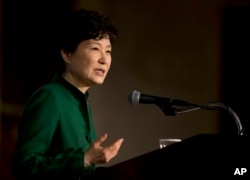South Korea’s National Assembly is divided over President’s Park Guen-hye’s constitutional amendment proposal to end the political stalemate in the country.
On Tuesday, Choo Mi-ae, leader of the opposition Democratic Party of Korea (that until recently called itself the Minjoo Party of Korea), said President Park’s sudden support for changing the constitution is a politically motivated move to shift public attention away from a domestic corruption scandal involving Park’s close friend and informal presidential adviser, Choi Sun-sil.
“South Koreans will not accept the constitutional revision which is a Sun-sil (based) constitutional revision to cover “Choi Sun-sil gate,” which is growing like a snowball,” said Choo.
Corruption
The Seoul Central District Prosecutors’ Office is investigating charges that Choi Sun-sil used her personal relationship with the president to elicit over $68 million from large Korean corporations to fund two sports foundations.
She then allegedly funneled the money into a German sports company called Widec Sports, that is operated by Choi and her daughter. They have both reportedly fled the country and their current whereabouts are unknown.
The opposition has called on Park to clarify her friend’s role in the administration, given that Choi does not hold an official position in government, and to explain the extent of her administration’s knowledge and involvement in this evolving scandal.
On Tuesday, President Park responded by issuing a public apology for improperly sharing sensitive government documents with Choi when collaborating on some presidential speeches.
“I did this to check the materials more precisely, but I think it is regrettable that I worried our people and hurt their feelings no matter what,” said Park.
However, the president did not concede that she broke the law by sending restricted materials to her friend.
The president has also ordered an investigation into the allegations and said anyone involved in illegal acts would face “stern” punishments.
Flip flopping
‘The furor over “Choi Sun-sil gate” indicates a deep distrust between Park and the opposition parties that could likely undermine any effort to change the constitution.
President Park’s call for revising the constitution reverses her past position that the country would be better served by focusing on immediate economic and security concerns rather than mounting a major political battle that would likely dominate the legislative agenda.
Now Park says she wants to lead an effort to change the constitutional requirement that limits the president to serve only a single five-year term, to provide more consistent policies over time in dealing with economic development and the North Korean nuclear threat.
“It has now become a piece of clothing that no longer fits,” said Park in a speech to the nation on Monday.
In the past, Park had voiced support for the American democratic model in which the president is elected to a four-year term and can run for a second term of office.
A ban on presidents serving more than one term was instituted in 1987 when South Korea first became a democracy to prevent one ruler from again dominating the political system.
In 1969, President Park’s father, Park Chung-hee altered the constitution to extend his own autocratic rule that lasted for over two decades.
Sincerity
Park’s Saenuri Party lost its majority in this year’s legislation elections and has been dealing with a contentious legislative government audit controlled by the opposition parties that uncovered the Choi Sun-sil scandal.
A Tuesday editorial in the Korea Joongang Daily newspaper in Seoul questioned Park’s motivation to initiate a major legislative initiative at this time saying, “If she really wants the public to believe in her sincerity in pushing for an amendment she must first clear of all the noise.”
The president’s approval rating is at 26 percent, the lowest since she took power in February 2013.
Opinion polls show that 70 percent of the South Korean public support changing the constitution, but there is no broad consensus on what type of change is needed.
Some in the National Assembly want to limit the power of the presidency and some advocate for a European style parliamentary system headed by a prime minister.
Constitutional changes can only be made with 2/3 support in the National Assembly and approval in a national referendum.
Youmi Kim in Seoul contributed to this report.






